The Role of Magnesium for Night Cramps
🌙 Introduction: When Night Cramps Ruin Rest
It starts suddenly — a sharp, twisting pain in your calf or foot. You jolt awake, clutching your leg, trying to stretch it out. The muscle feels like it’s locked in a vise.
Nighttime leg cramps are incredibly common, affecting up to 60% of adults at some point in their lives. For some, they’re occasional annoyances; for others, they’re chronic, painful, and disruptive to sleep and recovery.
But what if the answer to calmer nights isn’t a pill or painkiller, but a simple mineral that your body might be missing?
Enter magnesium — a nutrient responsible for muscle relaxation, nerve signaling, and over 300 biochemical reactions in the body. 🌿
In this article, we’ll explore:
What causes nighttime cramps
Why magnesium is so crucial for muscle function
Which forms work best for absorption
How to combine it with other nutrients for lasting relief
Let’s dig in — and help you finally sleep without the midnight muscle surprises. 😴
Looking for supplements for This? Click here.
⚡ Part 1: What Exactly Are Night Cramps?
🦵 The Basics
A muscle cramp is an involuntary, painful contraction that can last anywhere from a few seconds to several minutes.
Night cramps often affect:
Calves (most common)
Feet or toes
Hamstrings
They usually strike during rest or sleep, when your muscles are inactive and your electrolyte balance shifts.
💥 Common Triggers
Electrolyte Imbalance
Low levels of magnesium, potassium, calcium, or sodium disrupt the electrical signals that tell your muscles when to contract or relax.
Dehydration
Losing fluids through sweat or insufficient intake reduces circulation and mineral concentration in the blood.
Overuse or Fatigue
Strenuous exercise (especially without proper recovery) increases lactic acid buildup and muscle excitability.
Poor Circulation
Restricted blood flow can starve muscles of oxygen and trigger cramping.
Medication Side Effects
Diuretics, statins, and beta-blockers can deplete magnesium or potassium.
Pregnancy
Hormonal changes and increased nutrient demands often lead to nighttime leg cramps.
Nerve or Metabolic Disorders
Conditions like diabetes or thyroid imbalance can heighten muscle excitability.
But the most overlooked — and easiest to fix — cause is magnesium deficiency.
🧂 Part 2: The Science of Magnesium and Muscle Function
🔬 The Role of Magnesium in the Body
Magnesium is one of the body’s most important electrolytes. It regulates electrical impulses between nerves and muscles, helping them contract and relax in perfect rhythm.
Every movement — from blinking to breathing — relies on magnesium.
It works hand-in-hand with calcium:
Calcium → triggers muscle contraction.
Magnesium → signals the muscle to relax.
Without enough magnesium, your muscles stay partially contracted, leading to spasms, tightness, and painful cramps.
🧠 How Magnesium Prevents Cramping
Blocks Excess Calcium in Muscle Cells
Too much calcium = constant contraction.
Magnesium acts as a gatekeeper, allowing relaxation.
Regulates Electrolyte Balance
Magnesium works with sodium, potassium, and chloride to stabilize cell membranes and prevent erratic electrical activity.
Improves Energy Production (ATP)
Muscles rely on ATP (adenosine triphosphate) for movement. Magnesium binds to ATP, ensuring smooth contraction and release cycles.
Enhances Blood Flow and Oxygenation
Adequate magnesium supports vascular relaxation, improving nutrient delivery and waste removal from muscles.
Reduces Inflammation
Chronic low magnesium is linked with higher levels of inflammation, which can increase muscle irritation.
📉 Magnesium Deficiency: The Hidden Problem
Studies suggest that 40–50% of people in industrialized countries don’t meet the daily recommended intake for magnesium.
Modern diets — high in processed food and low in leafy greens, nuts, and whole grains — strip away this essential mineral.
Other factors that deplete magnesium:
Excess caffeine or alcohol
Stress (which increases magnesium loss through urine)
Certain medications (diuretics, proton pump inhibitors)
Heavy sweating or athletic training
If you often experience twitches, cramps, fatigue, or anxiety, your body may be signaling a magnesium shortage.
Looking for supplements for This? Click here.
💪 Part 3: Research Evidence — Does Magnesium Actually Help?

🧬 Clinical Studies
Older Adults and Nocturnal Cramps
A 1996 study published in Magnesium Research found that magnesium supplementation reduced both the frequency and intensity of night leg cramps in elderly participants.
Pregnancy-Related Cramps
In a 2012 randomized controlled trial (Maternal & Child Nutrition), women taking magnesium supplements experienced significantly fewer nighttime cramps compared to the placebo group.
Athletes and Recovery
Studies show magnesium replenishment reduces post-exercise cramping and muscle fatigue, especially in endurance athletes.
Mixed Evidence
While some meta-analyses show modest effects, individual responses vary — suggesting that magnesium works best when deficiency is present.
💡 Translation: If your cramps are magnesium-related, supplementing can be life-changing.
🌿 Part 4: The Best Forms of Magnesium for Night Cramps
Not all magnesium supplements are created equal. Some absorb better, while others act as gentle laxatives. Here’s how to choose the right one:
1️⃣ Magnesium Glycinate — The Calming All-Star
Highly bioavailable and gentle on the stomach.
Binds with glycine, an amino acid that promotes relaxation and sleep.
Best for:
People with anxiety, insomnia, or muscle tension
Sensitive digestion
🧘 Bonus: The glycine component enhances GABA signaling — your brain’s “calm-down” neurotransmitter.
2️⃣ Magnesium Citrate — For Absorption & Hydration
Well-absorbed and supports bowel regularity.
Great if dehydration or electrolyte imbalance is contributing to cramps.
Best for:
Constipation or mild digestive sluggishness
🚫 Note: High doses may cause loose stools.
3️⃣ Magnesium Malate — For Muscle Energy
Combines magnesium with malic acid, which supports ATP production in muscles.
Best for:
Athletes or those with fatigue-related cramps
Daytime tightness or soreness
4️⃣ Magnesium Threonate — For Brain and Nerve Function
Penetrates the blood-brain barrier and supports neurological relaxation.
May improve sleep depth and nerve-related muscle tension.
Best for:
Those with stress-related cramps or poor sleep quality.
5️⃣ Magnesium Chloride or Sulfate (Topical)
Found in Epsom salt baths or sprays.
Absorbs through the skin and relaxes local muscles directly.
Best for:
Targeted leg or foot cramps
People who prefer non-oral supplementation
🛁 Tip: Add 1–2 cups of Epsom salt to a warm bath before bed.
🩺 Part 5: How Much Magnesium Do You Need?
| Group | Recommended Daily Intake (RDA) |
|---|---|
| Adult Men | 400–420 mg |
| Adult Women | 310–320 mg |
| Pregnant Women | 350–360 mg |
| Athletes or High Stress | 400–500 mg |
For cramp relief: 300–400 mg of elemental magnesium daily (often split between morning and evening).
Caution:
Avoid excessive doses (>600 mg/day), which can cause diarrhea or interfere with calcium absorption.
🌙 Part 6: When to Take Magnesium for Night Cramps
Timing matters.
Evening or before bed is ideal, since magnesium promotes relaxation and sleep.
After exercise — helps restore electrolyte balance.
With food — improves absorption and reduces GI discomfort.
💡 If using magnesium glycinate or citrate, take it 1–2 hours before bedtime with a small snack or herbal tea.
🌾 Part 7: Nutrients That Work Synergistically with Magnesium
🧠 1️⃣ Potassium
Helps transmit nerve impulses and prevent muscle contractions from “locking up.”
Food sources: Bananas, potatoes, avocados, coconut water.
🥛 2️⃣ Calcium
Works in tandem with magnesium — calcium contracts, magnesium relaxes.
Balance both for smooth muscle function.
🌞 3️⃣ Vitamin D
Improves magnesium absorption and utilization.
Tip: Get sunlight exposure or take D3 + K2 supplements.
🩸 4️⃣ Sodium (in small amounts)
Low sodium can cause cramps just as high sodium can.
Balance electrolytes—especially for athletes or hot climates.
🍌 5️⃣ B Vitamins (B6 especially)
Enhance magnesium uptake and reduce muscle fatigue.
🧘 Part 8: The Role of Stress and Nervous System Regulation

Stress burns through magnesium reserves rapidly.
Chronic cortisol elevation increases magnesium loss through urine.
To truly stop night cramps, you need to calm the nervous system, not just the muscles.
Combine magnesium with:
L-Theanine (200 mg): Promotes alpha brain waves and calm alertness.
Ashwagandha (300 mg): Reduces cortisol and improves sleep quality.
Glycine (3 g): Lowers body temperature and improves muscle relaxation.
These work synergistically to reduce both physical and emotional tension that can trigger nighttime cramps.
🌿 Part 9: Lifestyle and Habit Fixes to Reinforce Supplementation
🥦 1️⃣ Eat Magnesium-Rich Foods
Replenish daily through diet:
Spinach, kale, Swiss chard 🥬
Pumpkin seeds, almonds, cashews 🥜
Avocado, dark chocolate 🍫
Whole grains like quinoa or brown rice
💧 2️⃣ Stay Hydrated
Drink water throughout the day and include electrolyte-rich fluids like coconut water or bone broth.
🧍 3️⃣ Stretch Before Bed
Gentle calf and hamstring stretches improve circulation and reduce nighttime muscle tightening.
Example:
Stand an arm’s length from a wall, step one foot back, press heel down for 30 seconds each side.
🛏️ 4️⃣ Warm Bath or Massage
Epsom salt baths supply magnesium sulfate and improve local relaxation.
Massage legs with magnesium oil or arnica cream before bed to soothe tight muscles.
🕯️ 5️⃣ Sleep Environment
Cold or cramped sleeping positions can worsen circulation.
Keep legs slightly elevated and ensure adequate blanket warmth.
🔍 Part 10: Who Is Most at Risk of Magnesium-Related Cramps?
Older adults — absorption declines with age.
Athletes — lose minerals through sweat.
Pregnant women — increased nutrient demands.
People on medications (diuretics, PPIs).
Individuals with gut issues (celiac, Crohn’s, IBS).
These groups often benefit the most from supplementation.
🧩 Part 11: How Long Does It Take to See Results?
Magnesium works gradually — it’s about rebalancing cells, not quick masking.
| Time Frame | What to Expect |
|---|---|
| 1–3 Days | Improved relaxation, fewer twitches |
| 1–2 Weeks | Reduced cramp frequency |
| 3–4 Weeks | Restored sleep and muscle recovery |
| 2+ Months | Full stabilization and prevention of recurrence |
Consistency is key. Magnesium works best when replenished daily.
⚠️ Part 12: Safety, Side Effects, and Interactions
Generally safe, but watch for:
Loose stools (especially with citrate)
Mild stomach upset (rare with glycinate)
Avoid if:
You have severe kidney disease (can’t excrete excess magnesium)
You’re taking antibiotics or bisphosphonates (space 2 hours apart)
💊 Tip: Always check with your healthcare provider before combining magnesium with medications.
🌈 Part 13: Real-Life Experiences
“I used to wake up almost every night with calf cramps. After adding 400 mg of magnesium glycinate and a banana before bed, they vanished.”
— Maria, 46
“I’m an endurance runner. Magnesium malate and electrolytes after training completely changed my recovery.”
— Tom, 38
“During pregnancy, I had painful leg cramps. My OB recommended magnesium — it was a lifesaver.”
— Sophie, 33
🌙 Final Thoughts: Magnesium — The Silent Night Guardian
Night cramps aren’t just annoying — they’re your body’s way of signaling imbalance.
Magnesium restores that balance, calming your muscles and your mind.
It works not as a sedative, but as a restorative mineral — bringing ease where there was tension, flow where there was tightness, and rest where there was pain.
With consistent use — and proper hydration, nutrition, and stretching — magnesium can help you move from restless nights to peaceful, cramp-free sleep. 🌌
Looking for online therapy ? Click Here.
📚 References
Garrison, S. R. et al. “Magnesium for Skeletal Muscle Cramps.” Cochrane Database of Systematic Reviews, 2012.
Peuhkuri, K. et al. “Diet and Sleep: Magnesium’s Role in Human Sleep Regulation.” Nutrients, 2012.
Abbasi, B. et al. “Effect of Magnesium Supplementation on Primary Insomnia in the Elderly.” J. Res. Med. Sci., 2012.
Rude, R. K. “Magnesium Deficiency and Muscle Function.” Am. J. Clin. Nutr., 2011.
Jafarpour, S. et al. “Magnesium Supplementation in Pregnancy: Effects on Leg Cramps.” Maternal & Child Nutrition, 2012.
de Baaij, J. H. F. et al. “Magnesium in Man: Implications for Health and Disease.” Physiological Reviews, 2015.
Wienecke, E. et al. “Magnesium Supplementation Improves Objective Sleep Quality.” J. Res. Med. Sci., 2016.
Sarris, J. et al. “Herbal and Nutritional Sleep Aids: Mechanisms and Evidence.” Phytotherapy Research, 2020.
National Institutes of Health (NIH). “Magnesium Fact Sheet for Health Professionals.” 2023.
Walker, M. Why We Sleep. Scribner, 2017.
Related Posts
-
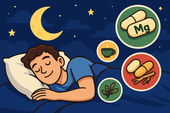
Supplements That Reduce Nighttime Awakenings
🌙 Discover science-backed supplements that help you stay asleep through the night. From magnesium and L-theanine to glycine and ashwagandha, learn how these natural compounds calm your nervous system, balance cortisol, and prevent 2 a.m. wake-ups for deeper, more restorative rest.
-

Nootropics That Promote Calm and Rest
Explore the world of calming nootropics — natural brain enhancers that promote relaxation, better focus, and deeper rest. Learn how L-Theanine, magnesium, ashwagandha, and other adaptogens help balance your nervous system, reduce stress, and support restorative sleep.
-

Best Natural Supplement Stack for Sleep
Discover the best natural supplement stack for deep, restorative sleep. Learn how nutrients like magnesium, L-theanine, glycine, and calming herbs such as chamomile and ashwagandha work together to relax your body, calm your mind, and improve sleep quality—naturally and safely.
-

Combining L-Theanine and Magnesium for Sleep: A Calm Night, Naturally
Discover how combining L-Theanine and Magnesium can help you drift into deep, restorative sleep. Learn how this natural duo calms the mind, relaxes the body, and supports your nervous system—without grogginess the next morning.
-

How to Sleep Better After Intense Workouts
Struggling to fall asleep after a tough workout? Learn how to optimize your post-training recovery with nutrition, hydration, and science-backed sleep strategies. Discover how to calm your nervous system, balance hormones, and wake up fully recharged for your next session.
-

Ashwagandha and Valerian: A Bedtime Combo for Deep Rest and Emotional Reset
Discover the calming synergy of Ashwagandha and Valerian root, two natural sleep aids that help quiet the mind, ease anxiety, and promote deeper rest. Learn how this herbal duo supports the nervous system, balances stress hormones, and restores emotional peace — without next-day grogginess.
-

How to Create a Resilience-Boosting Diet
Discover how to build emotional and physical strength from the inside out with a resilience-boosting diet 🍎. Learn which foods stabilize your mood, how supplements like magnesium and omega-3s strengthen your stress response, and why pairing nutrition with breathwork and therapy creates lasting calm, focus, and vitality 🌿💪.
-

Best Teas and Herbal Blends for Calmness: Nature’s Way to Restore Inner Peace
Ashwagandha, the ancient adaptogenic herb, helps your body find balance during stress. Known as “Indian ginseng,” it supports cortisol regulation, boosts energy, and restores calm clarity. Discover how this powerful root promotes resilience, emotional balance, and steady vitality — one cup at a time. 🌸
-

Parenting and Emotional Strength: How to Raise Children Without Losing Yourself
Empathy is the bridge that connects hearts — the quiet power to understand, feel, and support another’s emotions without judgment. Learn how empathy strengthens relationships, enhances communication, and cultivates deeper compassion in everyday life. 🌿
-

How to Bounce Back from Public Failure: Reclaiming Confidence, Purpose, and Power
Visualization is more than imagination — it’s brain training for resilience. By picturing calm, success, or healing, you activate the same neural pathways as real experience. Learn how daily visualization rewires your brain for confidence, emotional balance, and recovery from stress. ✨
-

Coping with Financial Stress Through Resilience: How to Stay Grounded When Money Feels Tight
Body awareness is the foundation of emotional resilience. By tuning into your body’s signals — tension, fatigue, or calm — you learn to recognize stress before it overwhelms you. Discover how mindfulness, gentle movement, and breathwork can deepen your connection with your body and restore balance from the inside out. 🧘
-

How to Stay Positive During Chronic Illness: A Guide to Emotional Strength and Hope
Creativity is more than art — it’s a form of healing. Whether through painting, writing, music, or small acts of expression, creativity helps release emotion, calm the nervous system, and reconnect you to joy. Discover how to use creativity as a tool for emotional balance, resilience, and self-discovery. 🌿
-

Resilience Tips for Caregivers: How to Stay Strong While Caring for Others
Joy isn’t the absence of pain — it’s the quiet strength to find light even in challenging times. Cultivating joy through small daily moments restores balance, releases stress, and reminds you of life’s beauty. Learn how to reconnect with authentic happiness, rebuild emotional energy, and nurture your nervous system through gratitude, presence, and play. 🌿
-

Building Resilience After a Breakup: How to Heal, Rebuild, and Rise Stronger
Social connection is one of the strongest predictors of emotional resilience. During difficult times, genuine relationships act as anchors — calming the nervous system, reducing stress hormones, and helping you regain perspective. Learn how cultivating real human connection can strengthen your mind, heart, and overall well-being. 🌿
-

How to Stay Emotionally Strong During Job Loss
Your emotions are powered by brain chemistry — a delicate balance of neurotransmitters like serotonin, dopamine, and cortisol. When these chemicals work in harmony, you feel calm, focused, and resilient. Learn how daily habits, nutrition, and mindfulness can support your brain chemistry and boost emotional well-being naturally. 🌿
-

The Role of Hormones in Emotional Stability: How Your Chemistry Shapes Your Calm
Hormones shape more than your body — they shape your emotions, resilience, and sense of calm. From cortisol to serotonin, these chemical messengers influence how you react to stress, connect with others, and recover from challenges. Learn how to balance your hormones naturally to build lasting emotional stability and harmony within. 💫
-

Mitochondria and Emotional Energy: The Cellular Power Behind Your Mood
Breathwork is one of the most powerful tools for emotional regulation and cellular balance. Through intentional breathing, you can calm your nervous system, increase oxygen flow to the brain, and even support mitochondrial energy. Learn how conscious breathing connects body and mind — transforming stress into presence and emotional strength. 🌿
-

Inflammation and Its Impact on Mood Resilience: The Silent Link Between Body and Mind
Inflammation doesn’t just affect the body — it impacts the mind. Chronic inflammation alters brain chemistry, depletes serotonin, and makes emotional recovery harder. Learn how calming inflammation through nutrition, mindfulness, and sleep can restore balance, resilience, and a renewed sense of emotional strength. 💫
-

How Antioxidants Protect Emotional Well-being: The Hidden Link Between Oxidative Stress and Mental Health
Antioxidants do more than protect your body — they defend your mind. By neutralizing oxidative stress, antioxidants support serotonin, dopamine, and brain energy pathways that keep you calm, focused, and emotionally balanced. Discover how foods like berries, green tea, and dark chocolate nourish your brain, boost mood, and strengthen resilience from the inside out. 🌿✨
-

The HPA Axis and Emotional Health: The Hidden Bridge Between Stress and Mind
Neuroplasticity — the brain’s ability to rewire and adapt — is the foundation of emotional healing and resilience. When you face stress, trauma, or change, your neural pathways can reshape themselves to support new patterns of calm, focus, and self-awareness. Learn how daily practices like mindfulness, therapy, and breathwork strengthen neuroplasticity to transform emotional pain into personal growth. 🌸
-

Why Cortisol Control Is Key to Resilience: Mastering Stress to Build Emotional Strength
Controlling cortisol — the body’s main stress hormone — is the secret to lasting resilience. When cortisol levels stay balanced, your mind becomes clearer, emotions steadier, and energy more sustainable. Learn how breathwork, mindset shifts, adaptogens, and daily rhythms can help you calm your stress response and build true inner strength. 🌞💪
-

Dopamine’s Influence on Motivation and Recovery: Reigniting Drive and Balance
Healthy relationships are the foundation of emotional balance and resilience. Whether romantic, familial, or platonic, genuine connection releases dopamine, serotonin, and oxytocin — the brain’s “bonding trio” — helping us feel secure, motivated, and seen. Learn how trust, empathy, and communication not only strengthen your connections but also reshape your nervous system for deeper emotional well-being. 🌿🤝
-

The Role of Serotonin in Resilience: How This “Mood Molecule” Shapes Emotional Strength
Serotonin — often called the “resilience molecule” — plays a vital role in how we handle stress, regulate mood, and recover from emotional challenges. Beyond happiness, this powerful neurotransmitter helps balance the gut-brain axis, stabilize the nervous system, and support emotional flexibility. Learn how nutrition, sunlight, mindfulness, and adaptogens can naturally boost serotonin and strengthen your emotional resilience. 🌞🧠
-

How Neuroplasticity Supports Emotional Growth: Rewiring the Brain for Resilience
Neuroplasticity is the brain’s built-in power to grow, adapt, and heal — and it’s the foundation of emotional transformation. Every mindful breath, compassionate act, or reframed thought strengthens new neural pathways that support resilience and self-awareness. Learn how your brain rewires through daily habits, helping you turn emotional challenges into opportunities for growth and calm. 🌿
-

Tai Chi and Adaptogens for Mind-Body Balance: The Art of Harmonizing Energy and Resilience
Alchemy isn’t just an ancient science — it’s a timeless symbol of transformation and inner balance. By blending the physical and spiritual, alchemy teaches us that change begins from within. Just as metals are refined into gold, we too can transmute emotional pain, stress, and chaos into clarity and strength through mindful practice and self-awareness. 🌙✨
-

Cold Therapy and Emotional Control: Training the Mind Through the Body
Cold therapy isn’t just for athletes — it’s a tool for emotional mastery. By exposing your body to controlled cold, you train your nervous system to stay calm under stress, improving focus, mood, and resilience. This article explores the science of cold exposure, its impact on hormones and the vagus nerve, and how ice baths and cold showers can help you build emotional control, one breath at a time. 🧊🧘♂️
-

How Music Influences Emotional Recovery: The Healing Soundtrack of the Mind
Neuroplasticity — the brain’s ability to rewire and heal itself — is at the heart of emotional recovery. Through mindful habits, music, therapy, and consistent mental stimulation, your brain can form new connections that support resilience and well-being. Discover how neuroplasticity turns pain into growth, helping you rebuild balance, focus, and emotional strength. 🌿
-

Nature Therapy for Building Resilience: Reconnecting With the Healing Power of the Earth
Nature therapy helps rebuild emotional resilience by reconnecting you with the healing rhythms of the Earth. From forest walks to sunlight exposure, nature restores balance to your nervous system, lowers stress hormones, and teaches emotional adaptability. Learn how spending time outdoors can enhance mental clarity, calm anxiety, and awaken your natural capacity to heal. 🌞
-

Breathwork Techniques That Pair with Supplements: The Ultimate Synergy for Stress Relief and Mental Clarity
Breathwork and supplements create a powerful mind-body synergy for stress relief, focus, and energy. By combining intentional breathing with adaptogens, nootropics, and calming nutrients, you can naturally regulate cortisol, sharpen mental clarity, and boost emotional balance. This guide explores the best breathwork techniques and supplement pairings to help you feel centered, calm, and energized from the inside out. 🌿
-

Why Cortisol Balance Matters for Emotional Strength
Balancing cortisol — your body’s main stress hormone — is essential for emotional resilience. When cortisol is chronically high, your mind stays stuck in survival mode, leading to fatigue, anxiety, and emotional instability. This article explores how nutrition, supplements, breathwork, and therapy can help restore healthy cortisol rhythms, regulate the nervous system, and strengthen your ability to handle life’s challenges with calm focus and emotional strength. 🌿
-

Best Supplements for Students During Exam Season: Focus, Energy, and Memory Support
Studying late into the night? Learn which natural supplements can boost focus, memory, and mental stamina during exam season — without the crash. From omega-3s to Bacopa and Rhodiola, discover your brain’s ultimate exam support stack. 🎓🧠
-

Natural Memory Boosters for Seniors: How to Keep Your Mind Sharp and Focused
Stay mentally sharp and confident as you age. Discover science-backed natural supplements and lifestyle habits that boost memory, focus, and brain longevity for seniors. 🌿🧠
-

The Link Between Stress, Cortisol, and Memory Loss
Chronic stress can quietly erode your memory — and cortisol is the key culprit. Learn how stress hormones affect the brain, why the hippocampus shrinks under pressure, and how natural strategies can help you restore memory and mental clarity. 🧠✨
-

How to Build a Daily Supplement Routine for Memory Health
Want to sharpen your memory and stay mentally clear? Learn how to build a daily supplement routine for memory health — from morning focus to nighttime brain repair. Discover science-backed nutrients that boost recall, focus, and long-term cognitive resilience. 🧠🌿
-

Top 5 Natural Supplements for Memory Recall and Focus
Looking to boost memory and concentration naturally? Discover the top 5 supplements — Bacopa, Ginkgo Biloba, Lion’s Mane, Rhodiola, and Phosphatidylserine — that enhance focus, recall, and long-term brain health. 🧠✨
-

Top Supplements to Balance Mood Naturally
From omega-3s to adaptogens, discover the top natural supplements proven to support emotional balance, reduce stress, and promote inner calm — safely and effectively. 🌿✨
-
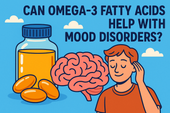
Can Omega-3 Fatty Acids Help with Mood Disorders?
Omega-3 fatty acids do more than support heart health — they can help balance mood, reduce depression, and calm anxiety. Discover how EPA and DHA nourish your brain, fight inflammation, and support emotional well-being from within. 🌊🧠
-

Vitamin D and Mood: The Sunshine Vitamin for Emotional Balance
Could the key to emotional balance be as simple as a little sunlight? Discover how vitamin D — the sunshine vitamin — influences serotonin, reduces inflammation, and helps you feel more positive and resilient year-round. ☀️💛
-

The Role of Magnesium in Reducing Irritability and Low Mood
Feeling on edge or emotionally drained? Magnesium could be the missing link between your body and your mood. Discover how this essential mineral reduces irritability, balances neurotransmitters, and helps your nervous system find calm again. 🌿✨
-
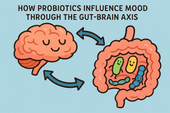
How Probiotics Influence Mood Through the Gut-Brain Axis
Discover how probiotics can do more than support your digestion—they can actually uplift your mood. This article explores the fascinating gut-brain axis and how balancing your gut bacteria through probiotics may help reduce anxiety, improve emotional stability, and support long-term mental well-being. 🌿🧠
-
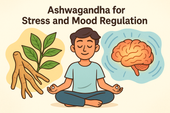
Ashwagandha for Stress and Mood Regulation
Discover how Ashwagandha, the powerful adaptogenic herb 🌿, helps your body manage stress and regulate mood. Learn how it balances cortisol, boosts GABA and serotonin, and supports emotional stability — helping you feel calm, focused, and resilient every day.
-
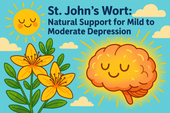
St. John’s Wort: Natural Support for Mild to Moderate Depression
Discover how St. John’s Wort, the “sunshine herb” 🌼, naturally supports mild to moderate depression. Learn how it boosts serotonin, balances mood, and promotes emotional resilience — with research showing its effectiveness compares to antidepressants, but with fewer side effects.
-
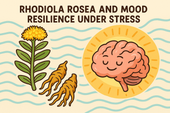
Rhodiola Rosea and Mood Resilience Under Stress
Discover how Rhodiola rosea helps your body adapt to stress 🌿. Learn how this powerful adaptogen balances cortisol, supports serotonin and dopamine, and strengthens emotional resilience — helping you stay calm, focused, and energized under pressure.
-

Chamomile and Lavender: Herbal Calm for Emotional Fluctuations
Discover how chamomile and lavender bring calm to emotional ups and downs 🌿. Learn how these two soothing herbs balance your nervous system, ease anxiety, and support restful sleep — naturally helping you find peace and emotional stability.
-
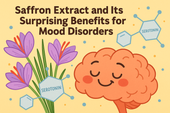
Saffron Extract and Its Surprising Benefits for Mood Disorders
Discover how saffron extract — the golden spice of joy 🌸 — can naturally support mood balance, ease anxiety, and lift mild depression. Learn what science says about its serotonin-boosting power, the ideal dosage, and how this ancient remedy compares to modern antidepressants.
-
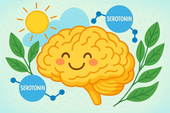
5-HTP and Serotonin: A Natural Path to Lifting Mood
Discover how 5-HTP naturally boosts serotonin 🌞 — the neurotransmitter behind mood, sleep, and emotional balance. Learn how this plant-derived compound supports happiness, reduces anxiety, and improves rest by helping your brain create more serotonin the gentle, natural way.
-
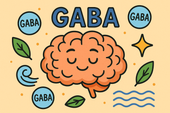
GABA Supplements for Reducing Anxiety and Mood Swings
Discover how GABA supplements can help reduce anxiety and balance mood naturally 🌿. Learn how this calming neurotransmitter works to quiet the mind, ease stress, and improve sleep — plus which nutrients and habits can boost your body’s own GABA production for long-term emotional stability.
-
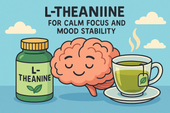
L-Theanine for Calm Focus and Mood Stability
Discover how L-theanine, the calming compound found in green tea 🍵, promotes focus, relaxation, and mood stability. Learn the science behind how it balances neurotransmitters, reduces stress hormones, and enhances clarity — helping you stay centered, calm, and productive without sedation.
-
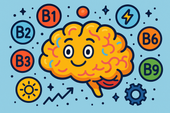
B Vitamins and Brain Chemistry: Supporting Energy and Emotional Balance
Discover how B vitamins power your brain chemistry ⚡. Learn how B6, B9, and B12 support serotonin, dopamine, and energy production — helping boost focus, mood, and emotional balance. From diet to supplements, explore how this vital nutrient group keeps your mind resilient and your energy steady.

















































